16 Top AI Courses for Compliance Analysts in 2025
Explore the leading AI courses tailored for compliance analysts in 2025, enhancing your skills with cutting-edge tools and techniques. Discover programs that blend regulatory insights with advanced AI, paving the way for smarter compliance solutions.

The landscape of compliance is undergoing significant transformation as artificial intelligence (AI) continues to grow and integrate into various sectors. For Compliance Analysts, this presents both a challenge and an opportunity. The rapid advancement of AI technology means that upskilling is no longer optional but essential to stay relevant in the field. As AI tools become more sophisticated, they are poised to impact job roles significantly, offering the potential to enhance capabilities and productivity. This article aims to equip Compliance Analysts with the knowledge needed to select the right AI courses, ensuring they are well-prepared for the future. With a focus on practical application and career advancement, these courses provide invaluable insights into AI's role in compliance.
Why AI matters for Compliance Analysts today
AI's relevance for Compliance Analysts is increasingly critical. With 69% of businesses already utilizing AI in some capacity, the pressure is on professionals to adapt quickly. The integration of AI into compliance operations can drive efficiency and accuracy, making it a key area for skill development. This article is designed to guide Compliance Analysts through the process of identifying the best AI courses available, helping them to enhance their professional toolkit and stay competitive in the job market.
The Growing Role of AI in Compliance Analysts
AI is reshaping how compliance tasks are performed, automating routine processes and enhancing decision-making capabilities. Key applications include data analysis, risk assessment, and regulatory compliance checks. AI can streamline workflows, reduce human error, and enable more personalized compliance strategies. By leveraging AI, Compliance Analysts can focus on higher-level strategic responsibilities, making their roles more impactful and efficient.
Benefits of becoming an AI expert in Compliance Analysts
For Compliance Analysts, becoming proficient in AI offers numerous benefits. It enables professionals to handle large volumes of data more effectively and improve accuracy in compliance reporting. AI expertise can lead to enhanced career prospects, as organizations increasingly seek individuals who can drive innovation and efficiency within compliance departments. Moreover, understanding AI applications can lead to more strategic decision-making, ultimately contributing to better risk management and compliance outcomes.
The article will compare 16 AI courses in this field, including the CompleteAI Training, which offers a comprehensive selection of video courses and certifications specifically for Compliance Analysts. Whether you are looking to deepen your understanding or expand your skill set, these courses can provide the knowledge and tools necessary to thrive in the evolving compliance landscape.

Comparison: All AI Courses for Compliance Analysts (Updated Q2' 2025)
| Course Name | Provider | Price | Key Topics | Pros | Cons | Best For |
|---|---|---|---|---|---|---|
| AI for Compliance Analysts | CompleteAI Training | $29/month or $8.25/month billed annually | Specialized video courses, certifications, AI tools updates, industry news | Highest rating, extensive courses, daily updates, affordable pricing | Subscription based, crucial for continuous learning | Compliance Analysts professionals |
| AI for Business Specialization | University of Pennsylvania | Free | Foundational AI concepts, ethical considerations, fraud prevention | Free, flexible, covers ethics, practical assessments | Requires self-discipline for self-paced learning | General learners |
| Finance AI Certificate Program | MIT Sloan Management Review Connections | Contact provider for pricing | AI literacy, data strategy, regulatory implications | Instructor-led, interactive, regulatory focus | Pricing and schedule details require direct inquiry | General learners |
| Artificial Intelligence: Implications For Business Strategy | MIT Online (in collaboration with Get Smarter) | $3,200 | Generative AI, AI ethics, business strategy | Comprehensive, practical, flexible | Higher cost, weekly time commitment | General learners |
| Cornell University AI Strategy Certificate Program | Cornell University via eCornell | $2,730 or $700/month | AI technologies, strategic implementation, ethical considerations | Small class sizes, professional certification | Costly, weekly commitment | General learners |
| AI in Finance Specialisation | Centre for Finance, Technology, and Entrepreneurship | $720 | AI foundations, machine learning, regulatory skills | Self-paced, accessible, digital certificate | Requires self-motivation, moderate cost | General learners |
| AI Applications in Marketing and Finance | University of Pennsylvania | Free | AI applications in marketing and finance, fraud detection | Free, short duration, practical focus | Limited depth | General learners |
| AI for Finance | Udemy | $35 | AI techniques, financial forecasting, predictive modeling | Affordable, practical coding skills | Requires basic finance and programming knowledge | General learners |
| ICA Specialist Certificate in AI for Compliance Professionals | International Compliance Association | $1,190 | AI, ethics, compliance, RegTech | Industry expert content, practical implementation | Requires ICA membership, high cost | General learners |
| Artificial Intelligence: Business Strategies and Applications | University of California, Berkeley Executive Education | $2,000-$5,000 | AI integration, automation, machine learning | Focus on business integration, suitable for compliance analysts | More strategic than technical | General learners |
| IBM Applied AI Professional Certificate | IBM via Coursera | $39-$79/month | AI basics, machine learning, IBM Watson tools | Accessible, practical AI skills | Requires some Python knowledge | General learners |
Understanding AI Training for Compliance Analysts Professionals
As the use of artificial intelligence (AI) continues to grow across various industries, compliance analysts are increasingly seeking specialized training to enhance their skills in AI applications. This article provides a comprehensive comparison of AI courses tailored for compliance analysts, highlighting the features, pros, and cons of each course to help professionals make informed decisions about their educational investments.
Course 1: CompleteAI Training
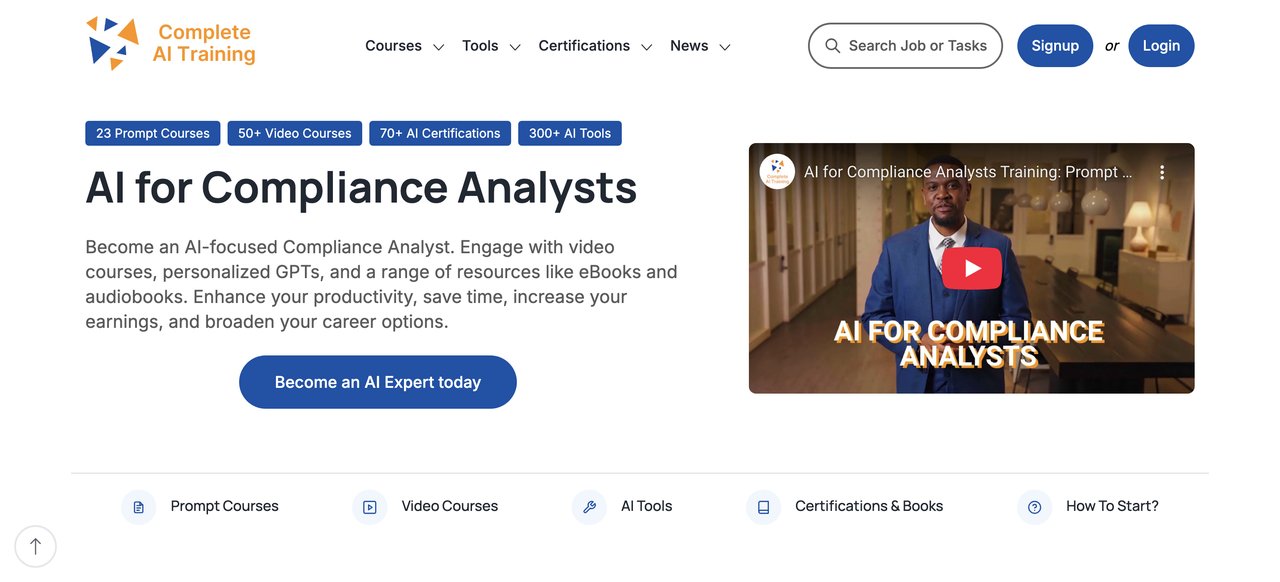
CompleteAI Training offers an extensive library of over 100 specialized video courses and certifications specifically designed for compliance analysts. Subscribers receive daily updates on the latest AI tools and curated industry news, ensuring they remain informed about developments relevant to their field. The platform's affordable pricing model makes it accessible to professionals at all career stages.
Key Topics Covered: Comprehensive AI education, AI tools, industry news
Target Audience and Skill Level Requirements: Suitable for compliance analysts at all levels
- Pros:
- Highest rating and most complete offering for compliance analysts
- Extensive range of AI courses and certifications
- Daily updates on relevant AI tools and news
- Very affordable pricing, especially with annual billing
- Cons:
- Subscription-based, requires ongoing commitment to keep up with AI developments
Who Would Benefit Most: Compliance analysts seeking a comprehensive and regularly updated AI learning resource.
Course 2: AI for Business Specialization by University of Pennsylvania
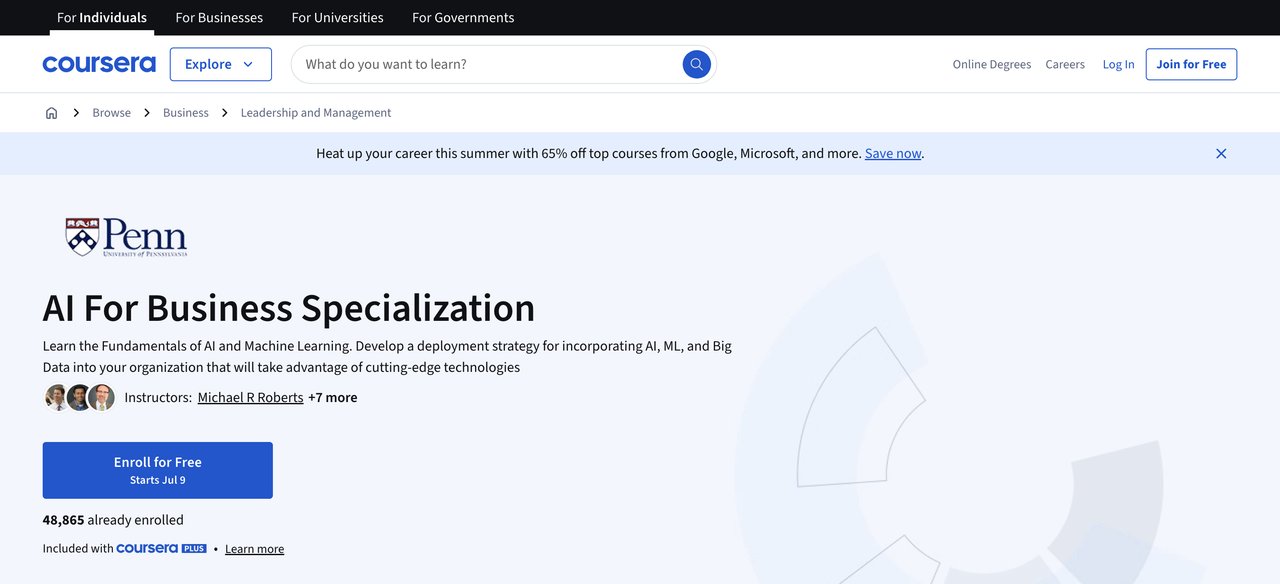
The University of Pennsylvania offers a free AI for Business Specialization course via Coursera, focusing on foundational AI concepts, machine learning, and Big Data with an emphasis on ethical considerations. This course is highly relevant for compliance analysts due to its practical assessments and self-paced flexibility.
Key Topics Covered: AI applications, ethical governance, fraud prevention, personalization technology
Target Audience and Skill Level Requirements: Beginner to intermediate; requires self-discipline
- Pros:
- Free and flexible
- Covers ethics and governance in AI
- Includes practical assessments
- Cons:
- Requires self-discipline for self-paced learning
Who Would Benefit Most: Compliance analysts interested in understanding AI's ethical implications and governance.
Course 3: Finance AI Certificate Program by MIT Sloan Management Review Connections
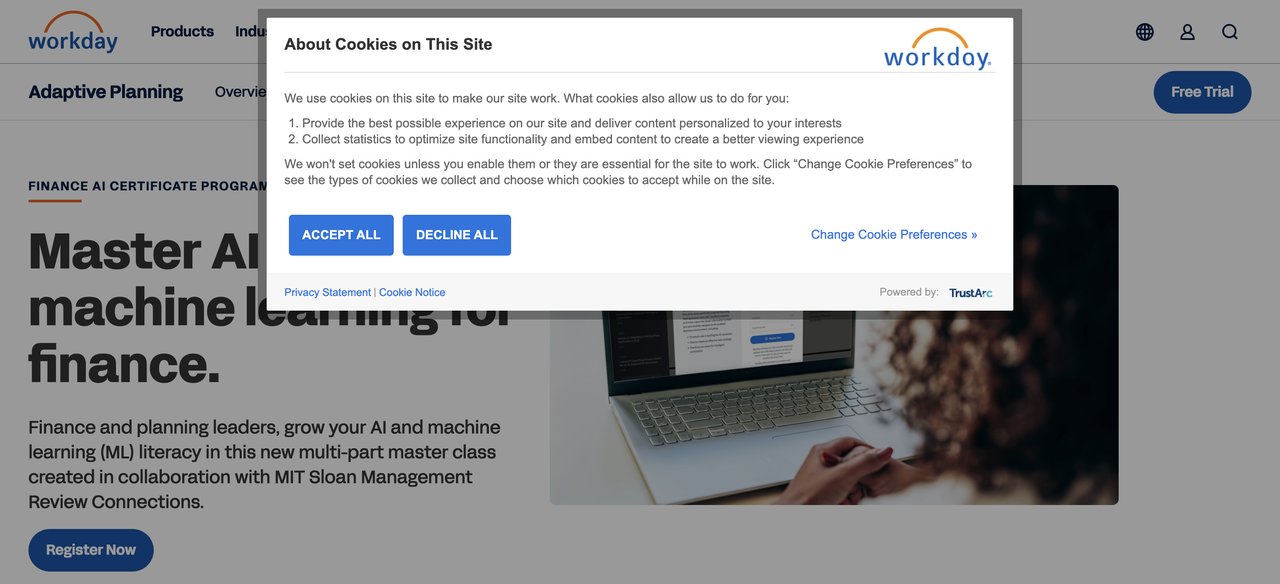
This instructor-led program from MIT Sloan covers AI literacy, data strategy for explainable AI, and regulatory implications. It is particularly beneficial for compliance analysts due to its focus on regulatory challenges and practical use cases.
Key Topics Covered: AI literacy, data strategy, regulatory implications, upskilling finance talent
Target Audience and Skill Level Requirements: Intermediate to advanced; requires direct inquiry for pricing
- Pros:
- Instructor-led and interactive
- Focus on regulatory and operational challenges
- Cons:
- Pricing and schedule details require direct inquiry
Who Would Benefit Most: Compliance analysts needing a deeper understanding of regulatory challenges in AI.
Course 4: Artificial Intelligence: Implications For Business Strategy by MIT Online
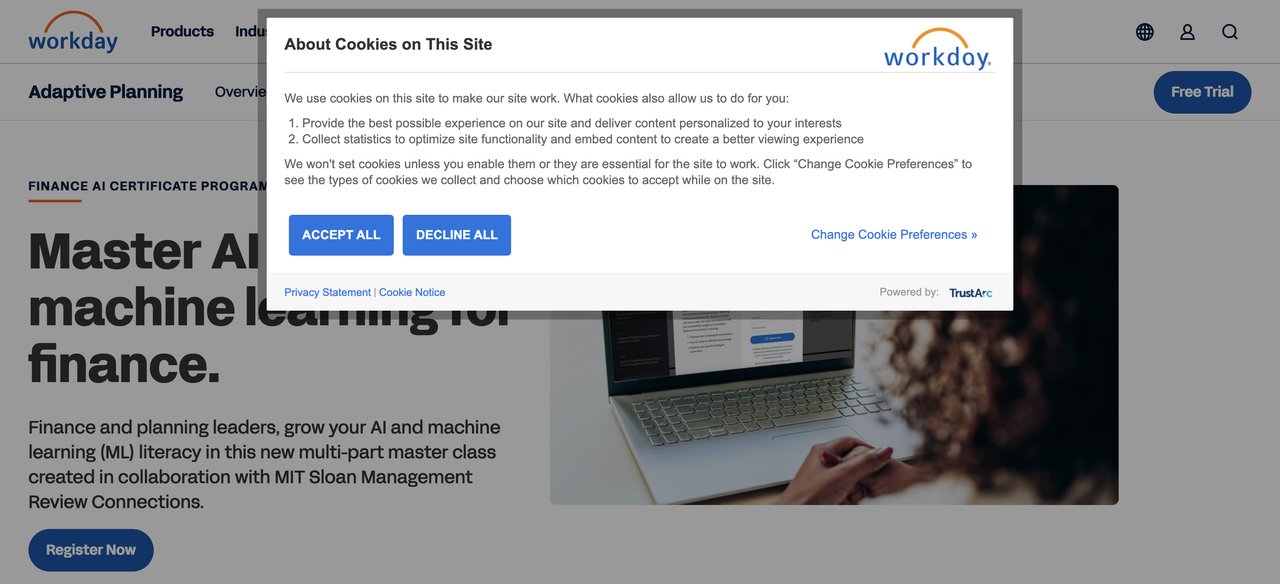
MIT Online offers a comprehensive 6-week course exploring AI's impact on business operations, including ethics and strategic implementation. It provides practical knowledge for compliance analysts to understand AI's role in business strategy and governance.
Key Topics Covered: Generative AI, business operations, AI ethics, strategic implementation
Target Audience and Skill Level Requirements: Intermediate to advanced; requires 6-8 hours per week commitment
- Pros:
- Comprehensive and practical
- Flexible weekly modules
- Cons:
- Higher cost
- Requires significant time commitment
Who Would Benefit Most: Compliance analysts interested in strategic AI implementation and governance.
Course 5: Cornell University AI Strategy Certificate Program by eCornell

This three-month program from Cornell University is designed for managers and senior leaders, focusing on AI technologies, strategic implementation, and societal impacts. It includes professional development credits and small class sizes.
Key Topics Covered: AI technologies, strategic implementation, ethical and regulatory considerations
Target Audience and Skill Level Requirements: Advanced; requires weekly 3-5 hours commitment
- Pros:
- Small class sizes and professional certification
- Comprehensive curriculum
- Cons:
- Costly
- Requires time commitment
Who Would Benefit Most: Senior compliance analysts seeking leadership skills in AI strategy.
Course 6: AI in Finance Specialisation by CFTE

Offered by the Centre for Finance, Technology, and Entrepreneurship (CFTE), this specialization includes four courses on AI foundations, machine learning, and regulatory skill sets. It caters to compliance analysts through case studies and practical projects.
Key Topics Covered: AI foundations, machine learning, regulatory skill sets, AI use cases in finance
Target Audience and Skill Level Requirements: Intermediate; self-paced
- Pros:
- Self-paced and accessible
- Includes digital certificate
- Cons:
- Requires self-motivation
- Cost may be moderate for some
Who Would Benefit Most: Compliance analysts interested in practical AI applications and regulatory compliance.
Course 7: AI Applications in Marketing and Finance by University of Pennsylvania
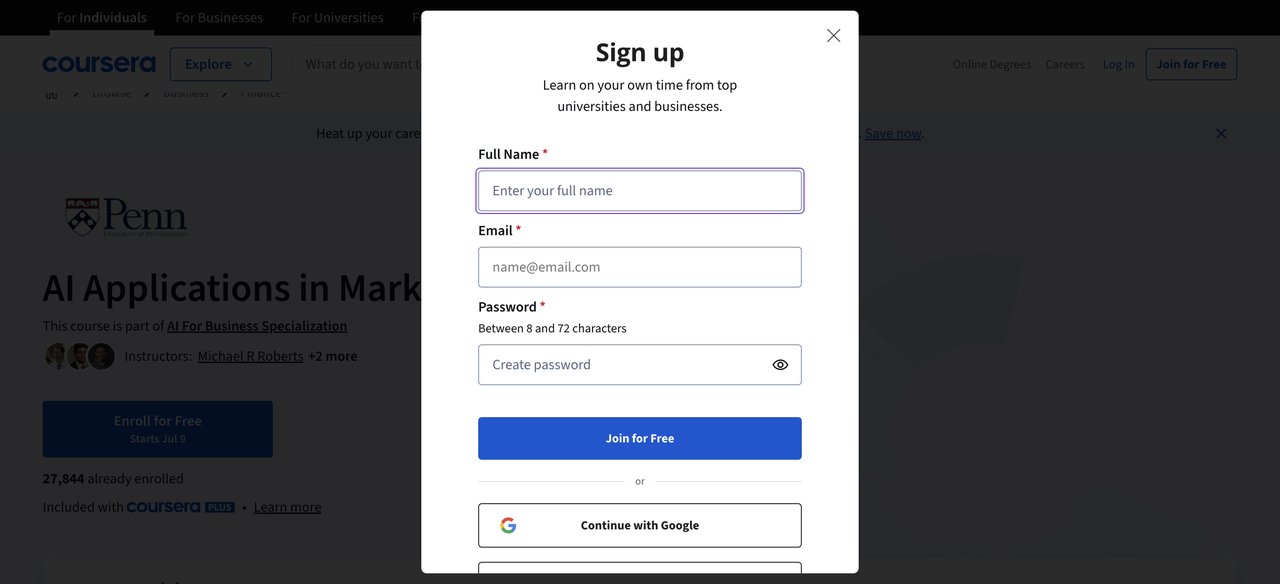
This course from the University of Pennsylvania focuses on AI-driven applications in marketing and finance. It covers topics such as fraud detection and risk management, offering practical insights for compliance analysts.
Key Topics Covered: AI applications in fraud detection, risk management, financial automation
Target Audience and Skill Level Requirements: Beginner; short duration (~6 hours)
- Pros:
- Free and practical
- Short duration
- Cons:
- Limited depth due to short length
Who Would Benefit Most: Compliance analysts seeking a quick overview of AI applications in finance.
Course 8: AI for Finance by Udemy
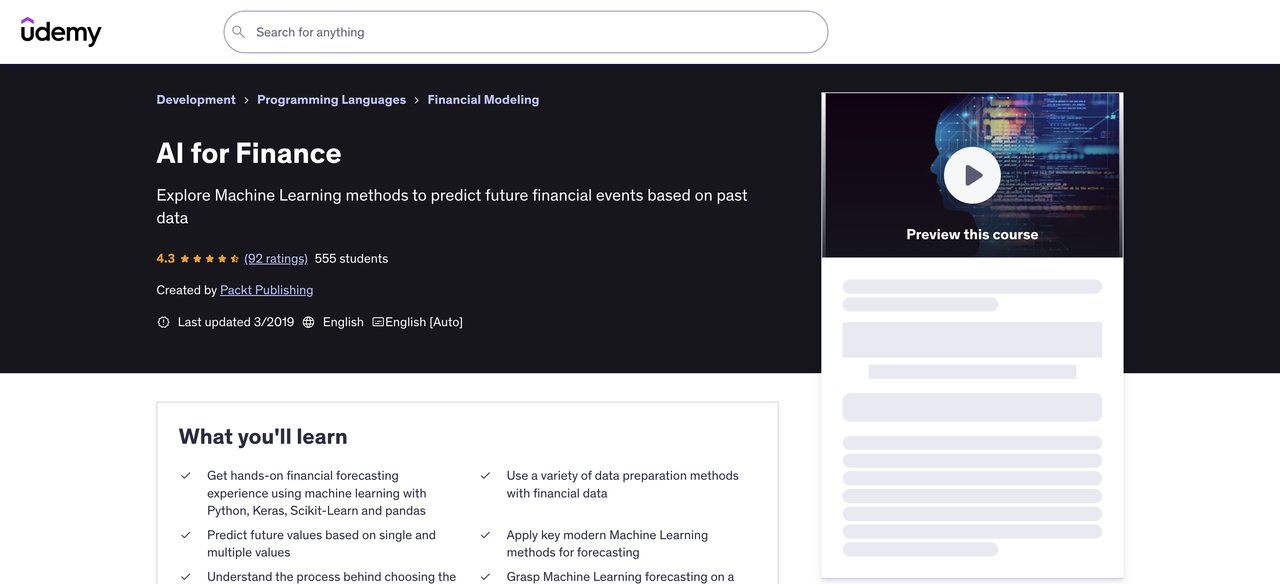
Udemy's AI for Finance course provides an affordable introduction to AI and machine learning techniques using Python. It is ideal for compliance analysts looking to develop technical AI skills in financial forecasting.
Key Topics Covered: AI techniques, financial forecasting, data preparation, predictive modeling
Target Audience and Skill Level Requirements: Beginner to intermediate; basic finance and programming knowledge required
- Pros:
- Affordable and practical
- Self-paced learning
- Cons:
- Requires basic finance and programming knowledge
Who Would Benefit Most: Compliance analysts interested in gaining hands-on experience with AI tools.
Course 9: ICA Specialist Certificate in AI for Compliance Professionals by ICA
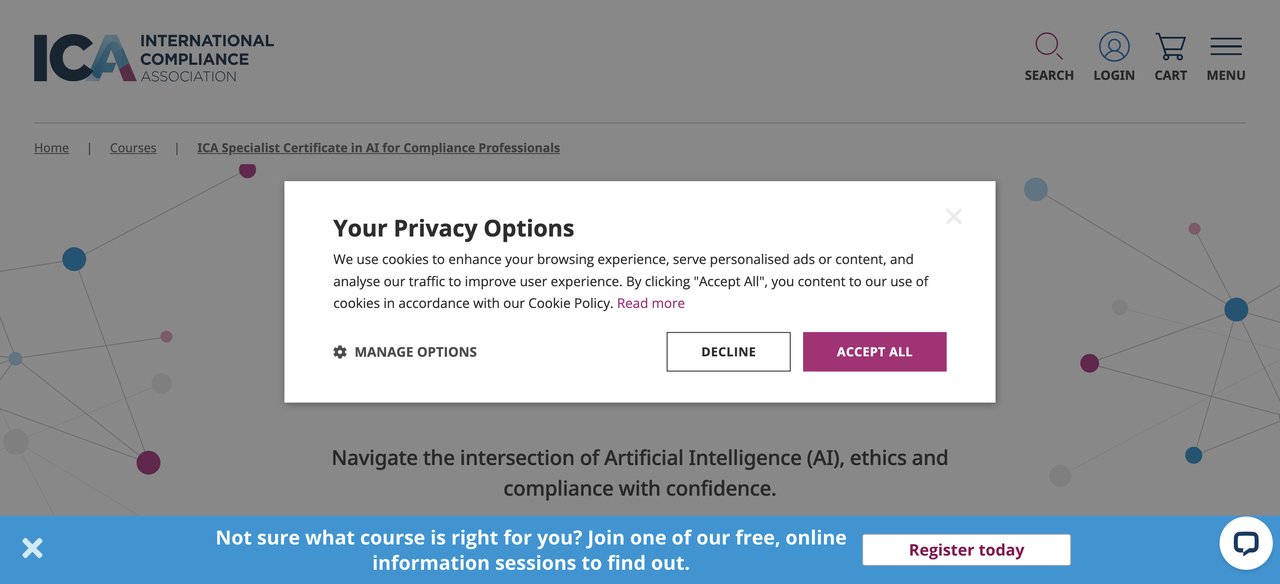
The International Compliance Association (ICA) offers a Specialist Certificate for compliance professionals. It covers AI, ethics, and compliance, focusing on practical implementation and ethical dilemmas.
Key Topics Covered: AI in RegTech, ethical dilemmas, future developments, case studies
Target Audience and Skill Level Requirements: Intermediate; requires ICA membership
- Pros:
- Written by industry experts
- Focus on practical implementation with case studies
- Recognized certification with CPD credits
- Cons:
- Requires ICA membership (additional cost)
- Pricing may be high for individual learners
Who Would Benefit Most: Compliance analysts focusing on ethical considerations and AI’s role in RegTech.
Course 10: Artificial Intelligence: Business Strategies and Applications by UC Berkeley
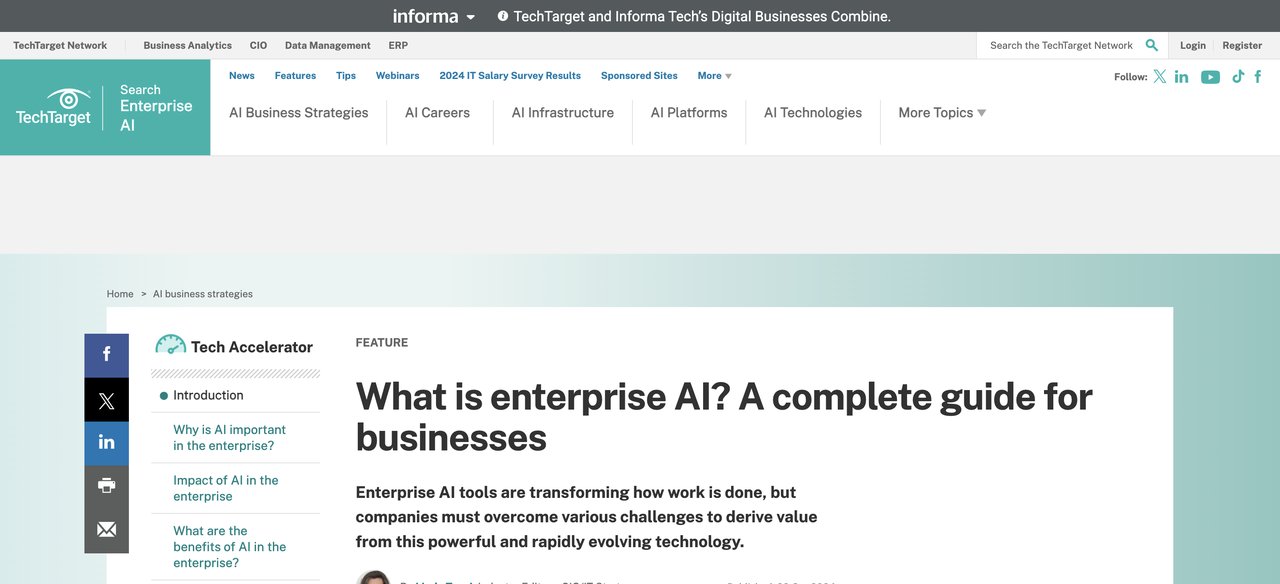
Offered by UC Berkeley, this course targets senior leaders and managers, including compliance analysts, to understand responsible AI integration. It covers AI capabilities, applications, automation, and managing AI teams.
Key Topics Covered: AI capabilities, machine learning, managing AI teams, strategic AI integration
Target Audience and Skill Level Requirements: Advanced; suitable for compliance analysts overseeing AI governance
- Pros:
- Focus on business integration and leadership
- Suitable for compliance analysts overseeing AI governance and risk
- Cons:
- More strategic than technical
- Not for deep AI development skills
Who Would Benefit Most: Compliance analysts in leadership roles seeking to integrate AI into business strategies.
Course 11: IBM Applied AI Professional Certificate by IBM
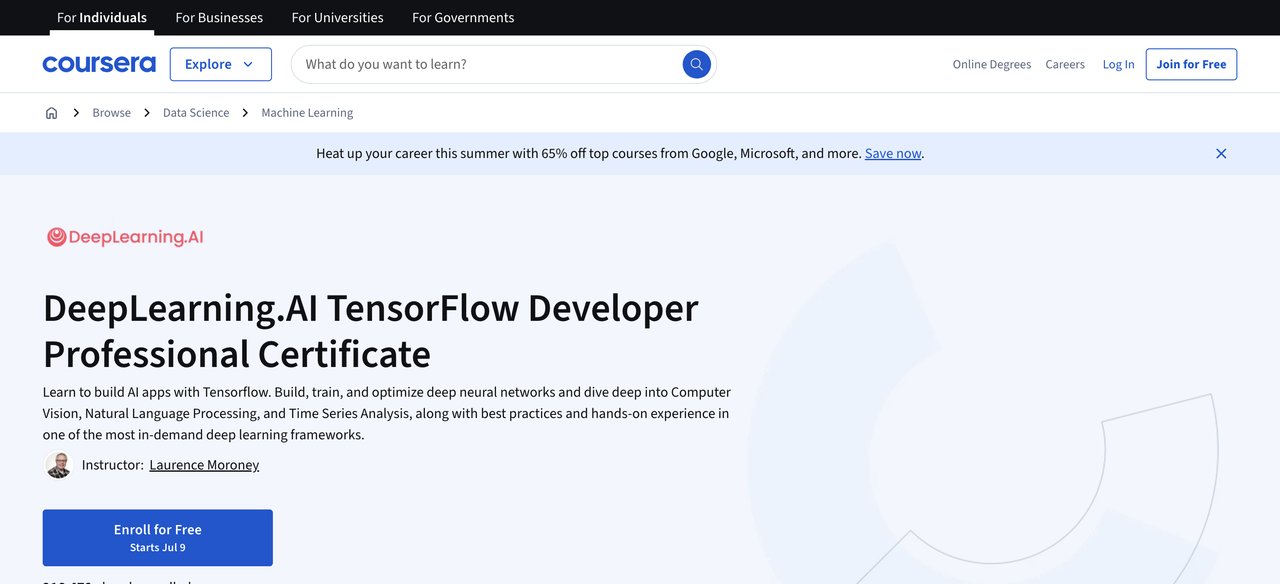
IBM offers a beginner-level AI certification via Coursera, introducing basic AI concepts and practical skills in AI tools like IBM Watson. It is accessible to non-technical learners and offers skills relevant for compliance monitoring.
Key Topics Covered: AI basics, machine learning, deep learning, neural networks, IBM Watson
Target Audience and Skill Level Requirements: Beginner; some Python knowledge required for final courses
- Pros:
- Accessible to non-technical learners
- Practical skills in AI tools
- Cons:
- Final courses require some Python knowledge
- May require additional programming prep
Who Would Benefit Most: Compliance analysts seeking to enhance their understanding of AI tools and applications.
Course 12: Master the Fundamentals of AI and Machine Learning by LinkedIn Learning

LinkedIn Learning offers a learning path of 10 short courses aimed at mastering AI and machine learning foundations. It focuses on AI accountability, explainable AI, and AI for project managers, with a strong emphasis on governance and risk.
Key Topics Covered: AI accountability, explainable AI, cybersecurity, governance
Target Audience and Skill Level Requirements: Beginner to intermediate; suitable for all experience levels
- Pros:
- Suitable for all experience levels
- Strong focus on accountability and explainability in AI
- Cons:
- Less technical depth
- More conceptual and managerial
Who Would Benefit Most: Compliance analysts interested in AI governance and risk management.
Course 13: Google Cloud’s Introduction to Generative AI Learning Path by Google Cloud

This course focuses on generative AI and large language models, emphasizing responsible AI practices and ethical considerations. It is beneficial for compliance analysts needing to understand generative AI risks and governance.
Key Topics Covered: Generative AI, responsible AI practices, ethical considerations
Target Audience and Skill Level Requirements: Beginner; Google-specific tools may limit applicability
- Pros:
- Emphasizes responsible AI
- Beginner-friendly
- Cons:
- Google-specific tools may limit applicability outside Google environments
Who Would Benefit Most: Compliance analysts focused on generative AI risks and governance.
Course 14: Artificial Intelligence Graduate Certificate by Stanford University
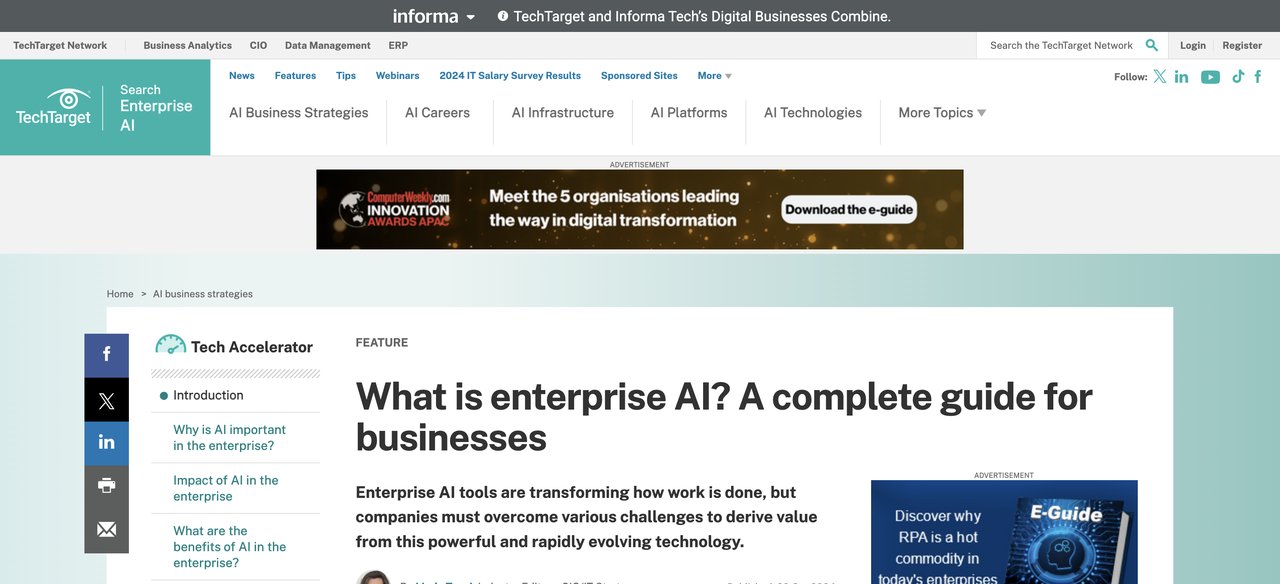
Stanford University offers an advanced program covering AI foundations including logic, probabilistic models, machine learning, and NLP. It is suitable for compliance analysts with technical backgrounds to assess compliance risks.
Key Topics Covered: Logic, probabilistic models, machine learning, robotics, NLP
Target Audience and Skill Level Requirements: Advanced; requires significant prior knowledge
- Pros:
- Comprehensive and rigorous
- Strong technical foundation
- Cons:
- Requires significant prior knowledge
- High time commitment
Who Would Benefit Most: Technically inclined compliance analysts aiming to deepen their AI expertise.
Course 15: Effective Compliance Programs by University of Pennsylvania
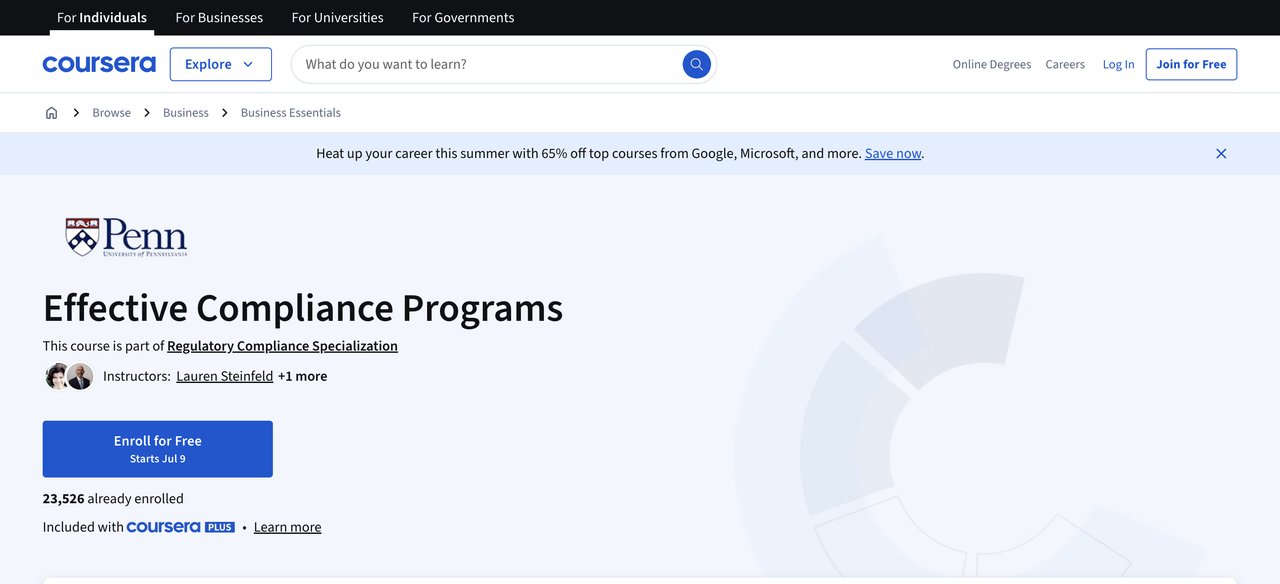
This course covers compliance training, management, regulatory compliance, and ethical standards. It helps compliance analysts build and maintain effective compliance programs, though it is not AI-specific.
Key Topics Covered: Compliance training, regulatory compliance, auditing, procedure development
Target Audience and Skill Level Requirements: Intermediate; flexible duration
- Pros:
- Broad compliance skills including ethics and culture transformation
- Highly rated
- Cons:
- Not AI-specific
- Certificate requires payment
Who Would Benefit Most: Compliance analysts looking to enhance general compliance skills.
Course 16: Security, Compliance, and Governance for AI Solutions by AWS
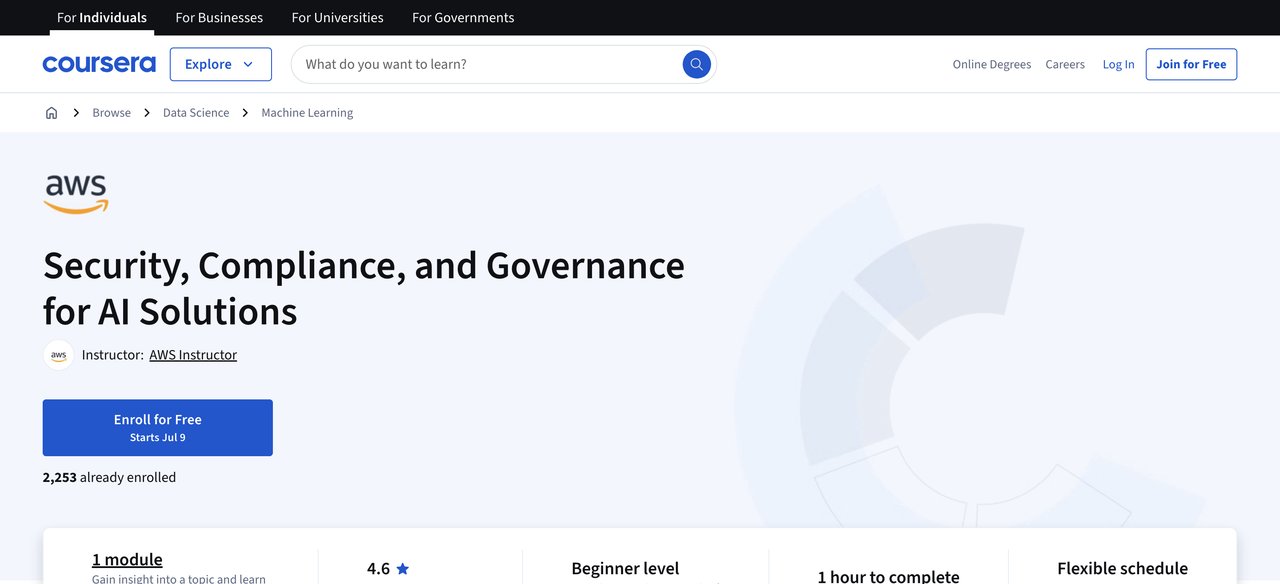
Offered by AWS via Coursera, this course focuses on AI-specific compliance, teaching data governance and cloud security. It is ideal for compliance analysts working with AI solutions in cloud environments.
Key Topics Covered: Data governance, AWS IAM, cloud security, information systems security
Target Audience and Skill Level Requirements: Beginner; AWS-specific focus
- Pros:
- Targeted at AI and cloud security compliance
- Beginner-friendly
- Cons:
- AWS-specific focus
- Certificate requires payment
Who Would Benefit Most: Compliance analysts focusing on AI solutions and cloud security.
Overall Recommendations
Choosing the right AI course depends on your specific needs and career goals as a compliance analyst. For a comprehensive and regularly updated resource, CompleteAI Training offers excellent value with its extensive library and daily updates. If you're seeking a free and flexible option that covers ethics and governance, the AI for Business Specialization by the University of Pennsylvania is a great choice. For those looking for an advanced, instructor-led program with a focus on regulatory challenges, the Finance AI Certificate Program by MIT Sloan is highly recommended. Ultimately, the best course for you will align with your current skill level, learning preferences, and specific career objectives.




